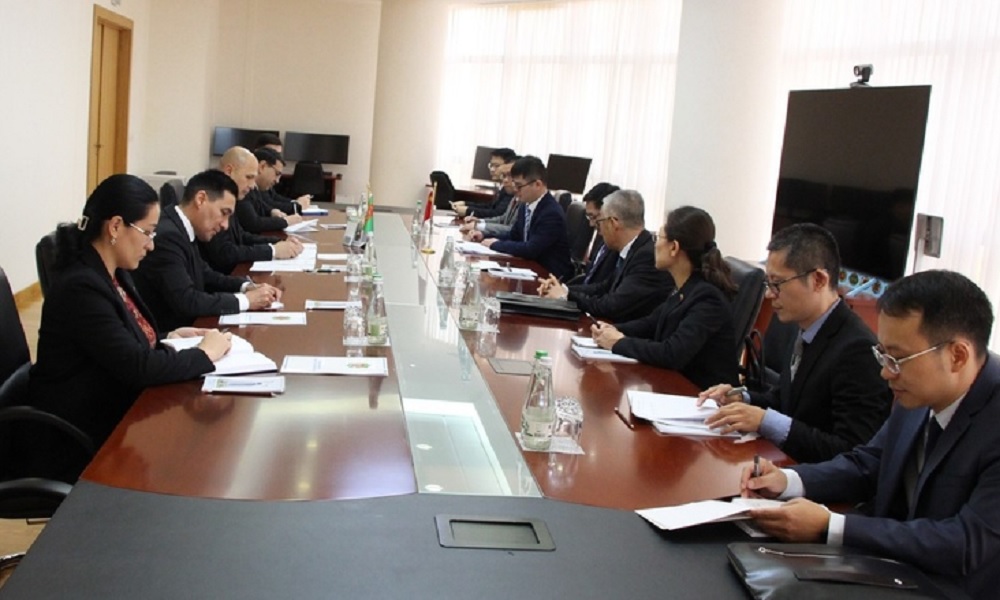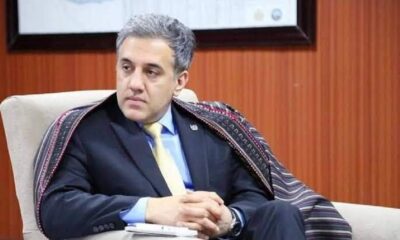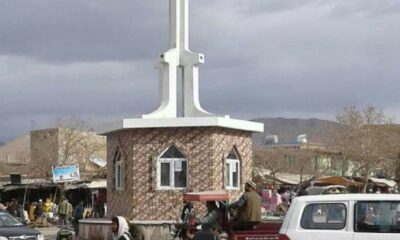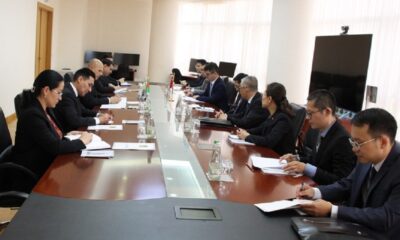Latest News
Bayat Power set to launch phase two of its gas to electricity power generating project

Bayat Power is hoping to start work on phase two of Bayat Power-1 in northern Jawzjan province in order to increase its electricity production output for Afghanistan.
Company officials said Sunday they have started discussions with relevant government departments in order to start the project.
Mohammad Shoaib Sahibzada, the technical head of Bayat Power, said once complete the second phase of the power plant project will add about 100 megawatts of electricity to the national grid. He said eventually, phase three will push output up to 200 megawatts.
In 2019, Bayat Power started work on Bayat Power-1’s 40MW gas-fired turbine, which achieved commercial operation later that year in Sheberghan. The plant uses Siemens Energy’s SGT-A45 mobile gas turbine, which will be integrated into phase two of the project.
Sahibzada meanwhile said phase one of the project, completed in November four years ago, has an output capacity of 40 megawatts and has provided hundreds of thousands of people with electricity in this time.
He also stated that the SGT-A45 turbine has the ability to produce 300 million kilowatts of electricity annually, which will be supplied to residential areas, mosques, universities, schools and hospitals in Jawzjan, Sar-e-Pul and Balkh provinces.
“The leadership of Bayat Power is in contact with the relevant departments and officials. Talks have started so that we can begin and implement the second phase of this project,” said Sahibzada.
He added that they have a contract with Da Afghanistan Breshna Sherkat (DABS), the country’s power supply company, for the distribution and regulation of electricity produced by Bayat Power, and that the company has signed another contract with Afghan Gas Company to increase the supply of natural gas.
Sahibzada also said Bayat Power has close working partnerships with DABS, Afghan Gas and other institutions including the Ministries of Mines and Petroleum, Energy and Water, as well as Siemens Energy - all of which help to provide more electricity to the nation.
“The benefits of this project from the point of view of electricity supply is that it was already able to provide electricity to hundreds of thousands of families, and the installed turbine has the [output] capacity of 40 megawatts of electricity,” Sahibzada added.
He also said phase two will bring the company closer to reaching its goal of producing 300 million kilowatt hours of electricity annually.
The Islamic Emirate has meanwhile welcomed Bayat Power’s plans to expand the output capacity. The IEA’s spokesman Zabihullah Mujahid said the Islamic Emirate gives its full support to the private sector.
“For the Islamic Emirate of Afghanistan, electrical energy is very important, it has vital value. Therefore, the Islamic Emirate pays a lot of attention to the private sector, if a company obtains an achievement, it means that it has been paid attention to. The Islamic Emirate has used all the possibilities to support the private sector and they are definitely moving forward,” said Mujahid.
Bayat Power was founded by the Bayat Group in 2013 with the aim of providing domestically produced electricity to the people of Afghanistan.
The power plant utilizes advanced and efficient technology, offering significantly more power and higher efficiency compared to other mobile gas turbines worldwide.
The project, in addition to generating significant tax revenues to the government, has created thousands of direct and indirect job opportunities for Afghans, contributing to the nation’s economic condition and fostering new technical skill sets amongst talented citizens.
Bayat Power, is in fact a trailblazer in Afghanistan’s independent power production sector, and just last week was awarded the prestigious Asian Power Award 2023 for its groundbreaking gas-fired mobile power plant.
On hand to accept the award on Wednesday night was Bayat Power’s CEO Ali Kasemi who said it was an honor and a privilege for the company to receive the accolade. He also said the award was an acknowledgement of the hard work and tenacity of Afghans in their quest for energy security and self-sufficiency in the power sector.
“Bayat Power is extremely proud that the Asian Power Awards have recognized our project as the Gas Power Project of the Year in Afghanistan. But we are even prouder of our continued efforts to improve the lives of Afghans across the country, enabling students to study at night, allowing health workers to provide critical services 24/7, supporting factory production, and lighting up cities, streets, mosques, and homes nationwide,” said Kasemi.
Latest News
Eleven people shot dead at shrine in Baghlan

Eleven people have been killed in a shooting at a shrine in Afghanistan’s northern Baghlan province, local sources said on Friday.
The incident took place at 9 pm on Thursday at the shrine of Sayed Padsha Jan in Shahr-e-Kuhna of Nahrin district.
A local resident said the dead were residents of Nahrin district and wanted to spend the night at the shrine.
Asadullah Mustafa Hashemi, the provincial information and culture director, confirmed the incident but did not provide details on how it happened or the number of casualties.
Provincial police spokesman said they had not received any information about the incident yet.
Latest News
Chinese, Turkmen officials meet to discuss Afghanistan

Deputy Minister of Foreign Affairs of Turkmenistan Serdar Muhammetdurdiyev on Thursday met with Chinese special envoy for Afghanistan, Yue Xiaoyong, the Foreign Ministry of Turkmenistan announced.
During the meeting, the sides discussed priority vectors of strategic interstate cooperation built on a long-term, mutually beneficial basis, as well as exchanged views on the implementation of previously reached agreements.
It was noted that personal contacts between the leaders of the two countries play a key role in intensifying the interstate dialogue, which give a strong impulse to further development and expansion of Turkmen-Chinese ties.
It was emphasized that Turkmenistan considers multilateral international platforms for maintaining stability in Afghanistan as an important factor in promoting sustainable improvement of socio-economic state of the neighboring country. The sides exchanged views on the preparations to the 5th meeting of Foreign Ministers of Afghanistan's Neighboring States to be held in Turkmenistan.
The interlocutors reaffirmed that Turkmenistan and China will continue to provide all-round support for the economic restoration of Afghanistan.
Latest News
U.S. House approves bill on evacuation of Afghan allies

The U.S. House Of Representatives has passed a legislation on evacuation of Afghans who assisted Americans during the 20-year war in Afghanistan.
“The passage of the CARE Authorization Act of 2024 further underscores the commitment made by the U.S. government to safeguard those who served shoulder-to-shoulder with our personnel during the twenty-year mission in Afghanistan,” Congresswoman Dina Titus said in a statement.
“The State Department has made it clear: There is no deadline for the crucial job of protecting Afghan allies. By authorizing the Coordinator for Afghan Relocation Efforts at the State Department, we can more effectively relocate and resettle those who have qualified to immigrate to the U.S. as a result of their service to this country.”
In 2022 the State Department established a specialized office called the Coordinator for Afghan Relocation Efforts (CARE) to streamline and coordinate the ongoing relocation and resettlement process for eligible Afghans from Afghanistan and Pakistan to the United States.
The CARE Authorization Act of 2024 will formally authorize the CARE office at the State Department for three years and grant important authorities to advance its mission. These include an extension of authorities to enter into personal services contracts as well as measures to streamline the transfer of funds to and from other agencies involved in the Afghan relocation mission.
-

 Sport5 days ago
Sport5 days agoFIFA unveils Innovative Club World Cup Trophy ahead of new tournament in 2025
-

 Latest News5 days ago
Latest News5 days agoTrump team compiling list of military officers responsible for US withdrawal from Afghanistan
-

 Latest News5 days ago
Latest News5 days agoCanada sent 19 failed asylum seekers back to Afghanistan last year
-

 Sport4 days ago
Sport4 days agoAbu Dhabi’s thrilling T10 tournament just days away
-

 World4 days ago
World4 days agoBiden allows Ukraine to use US arms to strike inside Russia
-

 Sport4 days ago
Sport4 days agoAfghanistan beat UAE by 169 runs in U19 tri-series
-

 Business5 days ago
Business5 days agoMullah Baradar inaugurates a blanket factory in Kabul
-

 Latest News4 days ago
Latest News4 days agoTwo Afghan diplomats posted to Germany under former government resign






















